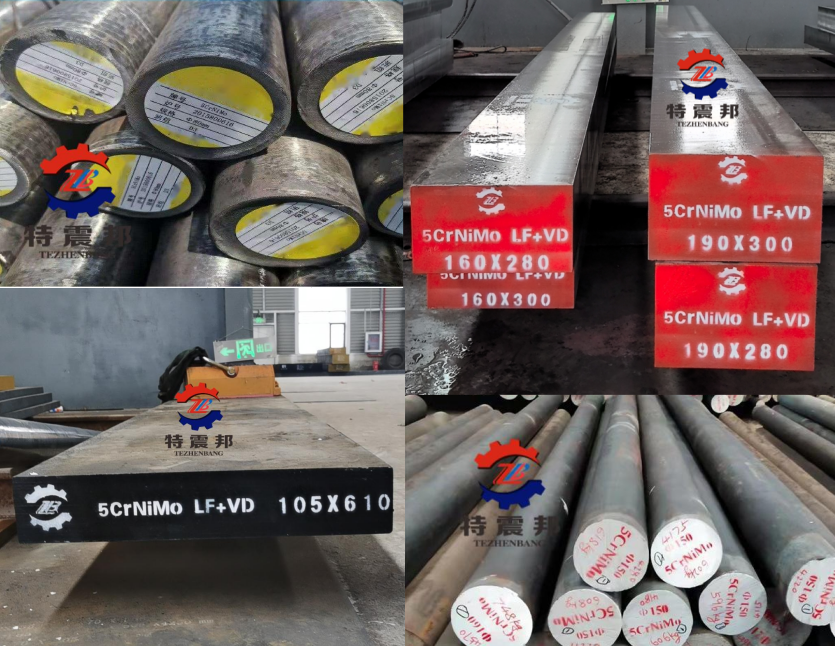Detailed Introduction
| Steel Grade (GB) |
Comparison of Grades from Various Countries |
Technical Conditions |
Chemical Composition |
||||||||||||||
| C |
Cr |
Mo |
V |
S |
P |
Si |
Mn |
Ni |
W |
Al |
Cu |
Nb |
Co |
B |
|||
| 5CrNiMo |
Germany (55NiCrMoV6) Japan (SKT4) USA (T61206) |
GB/T1299-1985
|
0.50 ¦ 0.60 |
0.50 ¦ 0.80 |
0.15 ¦ 0.30 |
0.80 ¦ 1.20 |
≤0.030 |
≤0.030 |
≤0.40 |
0.50 ¦ 0.80 |
1.40 ¦ 1.80 |
|
|
|
|
|
|
Hot Work Die Steel
5CrNiMo steel has good toughness, strength, and highwear resistance.It belongs toHot Work Die Steel.Its mechanical properties at room temperature and 500-600℃ arealmost the same. When heated to 500℃, it can still maintain a hardness of about HB300. Due to the presence of molybdenum in the steel, it is not sensitive totempering brittleness.After slowly cooling from 600℃,the impact toughnessonly slightly decreases.
Characteristics and Application Range
Its mechanical properties at room temperature and 500-600℃ are almost the same. When heated to 500℃, it can still maintain a hardness of about HB300. Due to the presence of molybdenum in the steel, it is not sensitive to tempering brittleness. After slowly cooling from 600℃, the impact toughness only slightly decreases.
5CrNiMo steel has good hardenability. For a large steel block of 300mm×400mm×300mm, after oil quenching at 820℃ and tempering at 560℃, the hardness of each part of the cross-section is almost uniform.
This type of steel is used to manufacture various large and medium-sized forging dies.
This type of steel is prone to white spots and requires strict control of the smelting process and cooling regime after forging.
5CrNiMo approximate composition foreign steel grades: USA L6 (AISI), Japan SKT4 (JIS), Japan GFA (Daito), Japan DM (Hitachi), Germany 1.2713 (W-Nr), France 55NiCrMoV7 (NF).
Technical Parameters
| After Quenching: |
58 |
| Quenching Temperature ℃: |
830-860 |
| Delivery Condition : |
Annealed HB≤241 |
| Cooling Medium: |
Oil |
Application Range
Suitable for manufacturing various complex shapes,impact loadlarge,working temperaturenot too high, edge length >400mm large and medium-sizedhammer forging diesandcutting edge dies.Used for manufacturing simple shapes in general.Manufacturing ProcessSmelting usesvacuum refining.The process ensures the purity of the steel; large-scale professional heat treatment is used to achieve the best pre-hardening effect, with hardnessevenly distributed..
5CrNiMo Tempering Process
Recommended Quenching Specifications for 5CrNiMo Steel
| Quenching Temperature/℃ |
Cooling Medium |
Medium Temperature/℃ |
Continuation |
Hardness (HRC) |
| 830-860 |
Cisco Quenching Liquid |
20-40 |
Immediately temper after cooling to 150-180℃. |
53-58 |
Note: 1. For large molds, the quenching heating temperature uses the upper limit, while small molds (edge length below 200-300mm) use the lower limit.
2. To avoid large stress and strain during quenching of hammer forging dies, heat from 830-860℃, first pre-cool in airto750-780℃, then oil cool to about 150-180℃, take out and immediately temper.
3. For large molds, they should first be placed in a heating furnace at 600-650℃.
3.对大型模具应先放在600~650℃的加热炉Preheat the middle, and then raise the furnace temperature after it is fully heated; to heat better, the mold should be placed on a pad board that is 60 to 100 mm high.
Image

key word:
Hot working mold steel
Cold working mold steel
Plastic mold steel
Forging series
Message Consultation
Service hotline:
Company address
Telephone
Address: No.128 Zhangzhihe Avenue, Dapaishan Village, Xisaishan District, Huangshi City, Hubei Province

